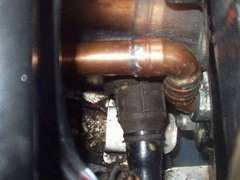
Tips on Soldering York Plumbing Joints
James - 2/4/07 at 11:06 PM
Had to resort to some copper plumbing pieces in my new rad setup to get round the rack.
Have never done any plumbing before so maybe that explains why it leaks! 
Any tips for plumbing soldering. I know that York fittings are the easy option so I'm obviously doing something retarded to have it leaking!
I'm using a Taymar blow lamp with a butane/propane mix. Is this too hot so I've given the joint too much heat?
Or maybe too little?
About how much time should I spent heating the joint to know it's melted fully?
Sorry for all the questions!
Thanks,
James
EDIT: I've got to replace a bathroom soon.... so any skills learnt here will come in very handy! 


[Edited on 2/4/07 by James]
graememk - 2/4/07 at 11:11 PM
maybe to much heat
were the joints nice and clean first, did you use flux ?
Peteff - 2/4/07 at 11:15 PM
Clean the end of the pipe and the inside of the joint with wire wool, shiny shiny. Flux the end of the pipe and push it in to the stop then warm the
joint and the pipe together till a ring of silver appears all round. Now stop.
James - 2/4/07 at 11:21 PM
Balls! You have to use flux with York do you? Hah! Didn't think of that! 
If I'd thought about it I'd have assumed it was used just for non-York fittings where you have to apply the solder yourself.
Thanks!!!
James
P.S. As well as fixing the car I may not flood the kitchen from the bathroom above now! 
RazMan - 3/4/07 at 06:45 AM
I always apply a little electrical solder to the joint to help things along. Beware of using too much heat or the solder just runs out of the joint -
just enough is just right 
Agriv8 - 3/4/07 at 06:58 AM
Yep clean up and a little flux.
Generally I kept warming mine until you get a nice ring of solder forming arround the lip of the joint.
Regards
Agriv8
JonBowden - 3/4/07 at 07:37 AM
quote:
I always apply a little electrical solder to the joint
Remember that you should NEVER do this on domestic water pipes since electrical solder contains lead - you should use lead free solder instead
RazMan - 3/4/07 at 07:53 AM
Ooooh that probably explains why I'm going senile too early 

bartonp - 3/4/07 at 08:12 AM
quote:
Originally posted by JonBowden
quote:
I always apply a little electrical solder to the joint
Remember that you should NEVER do this on domestic water pipes since electrical solder contains lead - you should use lead free solder instead
We still have lead pipes. Water co. maintains chemical content of water supply to prevent leaching of the lead.
DarrenW - 3/4/07 at 08:29 AM
As said before, pipes must be well shiny. Flux the joint. I always heat the pipe, you will see the heat ring travel down the pipe and into the joint,
once soldered the solder ring will be available. At this pint i remove the heat and apply a little more plumbing solder for good measure (end dipped
in flux first).
You will be amazed how easy it is when you get the hang of it.
If doing a number of joins close together assemble them up first.
Your failed joints will easily come apart with more heat. I find plumbing to be a very satisfying job. I bought the good quality torch, pipe cutters,
solder, flux etc and it makes it all a whole load easier.
BenB - 3/4/07 at 08:56 AM
Few tips- only apply flux to where you want the solder to go- if you liberally apply it all over the tube the solder will be more likely to run.
Also, apply the heat until you begin to see a very little silver solder peaking out of the joint. When you take off the heat the residual heat in the
joint will allow it to wick a bit more making perfect joints (or that's the plan anyway)....
Surrey Dave - 3/4/07 at 01:29 PM


Rescued attachment bottomhose1 vsml.jpg
James - 4/4/07 at 09:19 AM
Pretty much like that, yeah! 
Thanks for the tips everyone.
Cheers,
James
Marcus - 4/4/07 at 12:04 PM
quote:
Remember that you should NEVER do this on domestic water pipes since electrical solder contains lead - you should use lead free solder instead
Electrical solder hasn't had lead in it for years, so that's not problem, it's the flux that's not good for you.
John Bonnett - 7/4/07 at 08:19 PM
James, whatever you do, do not have your soft soldered pipework powder coated. Powder coating temperatures will melt the solder and the assembly will
fall to pieces.
John








